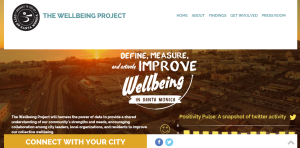Wellbeing evidence around the world: Wellbeing and Resilience Centre launch in South Australia
We’re excited to see that the whole state of South Australia has committed to building wellbeing and resilience. Locality-wide approaches really help us all understand what works to improve wellbeing.
South Australia’s Wellbeing and Resilience Centre launches today  at the South Australian Health and Medical Research Centre (SAHMRI) in Adelaide. The Centre will lead, measure, build, embed and evaluate resilience projects across South Australia and create a body of evidence about how to build wellbeing and resilience in different groups of people, at different ages. Follow their development → www.wellbeingandresilience.com @sahmriWRC
at the South Australian Health and Medical Research Centre (SAHMRI) in Adelaide. The Centre will lead, measure, build, embed and evaluate resilience projects across South Australia and create a body of evidence about how to build wellbeing and resilience in different groups of people, at different ages. Follow their development → www.wellbeingandresilience.com @sahmriWRC
 This state or city wide approach to residents’ wellbeing is happening around the world, including Santa Monica’s Wellbeing project in the USA which has set out to define, measure and improve wellbeing and the Happy City project here in Bristol, UK .
This state or city wide approach to residents’ wellbeing is happening around the world, including Santa Monica’s Wellbeing project in the USA which has set out to define, measure and improve wellbeing and the Happy City project here in Bristol, UK .
→ I know of other places doing this contact: whatworkswellbeingdevelopment@phe.gov.uk
Psychological resilience in the State of Wellbeing : South Australia
Statistics released by the Australia Bureau of Statistics (ABS) show that there are seven deaths by suicide per day in Australia.[i] South Australia has already unleashed a state-wide movement to build wellbeing and resilience in the population. The approach is based upon the use of positive psychology in the successful resilience project in the US Army 2008-15, which found that there were reductions in catastrophic thinking and diagnoses of substance abuse problems amongst soldiers who had received resilience training, as well as improvements to their positive coping skills, adaptability, and optimism[ii].
Over 14,000 South Australians were introduced to the science of positive psychology by Adelaide Thinker in Residence Professor Martin Seligman in 2012-2014. Premier of South Australia, the Hon Jay Weatherill, said there is evidence that positive psychology can be used to improve mental health and reduce mental illness.
In order to be able to meet the challenges that face our State, we need to build resilience within our schools, organisations and communities. We want South Australia to become the State of Wellbeing,
Mr Raymond Spencer, Chair of SAHMRI and the Economic Development Board, said evidence shows that an increase in unemployment of 1 per cent can lead to an increase in suicide of 0.7 per cent.[iii]
As South Australia adjusts to the loss of the auto-industry, we are determined to build resilience in our population,” Mr Spencer said. The resilience skills not only protect against mental illness, but also build individuals’ capacity to innovate, enter new employment and succeed in a dynamic economic environment.
SAHMRI’s Mind and Brain Theme Leader, Professor Julio Licinio, said the fields of psychiatry and psychology have taken a deficit-based approach to mental health for a long time.
The launch of the Wellbeing and Resilience Centre shows SAHMRI’s commitment to research the full spectrum of psychological health, exploring how we can not only decrease mental illness, but also increase wellbeing.
Ms Gabrielle Kelly, Director, Wellbeing and Resilience Centre, said the Slip Slop Slap message told Australia how to change behaviour to reduce skin cancer, and that Positive emotion, Engagement, Relationships, Meaning and Accomplishment (PERMA +) can work in the same way for mental health.
It can unify and align our all work to build positive mental health, Seligman’s research shows that you can improve wellbeing if you improve your PERMA. Also improving optimism, physical activity, nutrition and sleep supports positive mental health. Once this PERMA+ message is out there, everyone has in their own hands new knowledge about what to do to improve the mental health for themselves, their families and their businesses.
The resilience skills training used in South Australia, developed by a US company for the US military, are now being taught in South Australia to teachers, health workers, HR leaders, retrenched auto manufacturers, people aging in community, young disadvantaged people, and organisations looking to build a more robust workforce.
Future projects will involve resilience training for cancer survivors, parents of premature babies, staff and clients in aged care organisations, and the legal and medical professions.
i Australian Bureau of Statistics. (2015). Causes of Death, Australia, 2012. Catalogue No. 3303.0. Belconnen, ACT: Commonwealth of Australia. Accessed March 31, 2015 from http://www.abs.gov.au/ausstats/abs@.nsf/mf/3303.0?OpenDocument – See more at: http://www.mindframe-media.info/for-media/reporting-suicide/facts-and-stats#sthash.SfC3roYG.dpuf
ii. Lester, P. B., Harms, P. D., Herian, M. N., Krasikova, D. V. & Beal, S. J. 2011, ‘The Comprehensive Soldier Fitness Program Evaluation, Report # 3: Longitudinal analysis of the impact of Master Resiliency Training on self-reported resilience and psychological health data’, http://www.ppc.sas.upenn.edu/csftechreport3mrt.pdf
